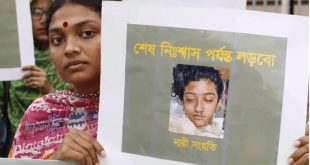Muslim hate crime has soared by 70 per cent in London and majority of victims are female. Radhika Sanghani hears horrific stories of Islamophobia from British women and asks why they’re being targeted
РђюIРђЎve been spat on in the street when IРђЎve worn my headscarf,РђЮ Sara Khan tells me.
РђюIРђЎve been called РђўOsama Bin LadenРђЎs wifeРђЎ. IРђЎve had people come right up to my face effing and blinding РђЊ even when I was pushing my six-month-old daughter in her pram”.
Khan, who heads up anti-extremist organisation Inspire, is a female victim of Islamophobia in Britain.
РђюItРђЎs shocking. YouРђЎre just minding your own business. ItРђЎs completely unprovoked,” she adds. “It tends to happen after a terrorist incident, and you think, ‘what have I done?’ You feel angry youРђЎre being associated with terrorists and extremists, but you also feel sad. ItРђЎs very dehumanising.РђЮ
Khan also tells me about one friend who had dog faeces put on her head, and another who was waiting at a bus stop, listening to her iPod and wearing a headscarf, when a man suddenly punched her. She was left with a black eye.
These are not isolated incidents. The Metropolitan Police has just released new statistics showing anti-Muslim hate crimes in Britain have risen by 70 per cent in the past year.
Tell Mama, an organisation that monitors Islamophobic attacks, says 60 per cent are directed at women, and happen on the street – as opposed to online.
Founder Fiyaz Mughal explains: РђюItРђЎs because the more physical, abusive ones [attacks] are directed at visibility – which means the hijab (headscarf) and the niqab (full-face veil).РђЮ
It means that women become obvious targets for racists РђЊ something Malaika Kayani knows well. She converted to Islam around eight years ago, and tells me sheРђЎs regularly experienced Islamophobia where she lives in Nottingham.
 Malaika Kayani
Malaika Kayani
РђюIРђЎve been on the bus and had people refuse to sit next to me when IРђЎve had my scarf on. I was walking with a friend once, when a man on a bike slammed his brakes and tried to ram it into us,” she tells me.
“IРђЎve had people swearing at me and insulting me. You donРђЎt need to always hear what they say because they look at you like youРђЎre pure filth.РђЮ
The abuse became so bad itРђЎs partly why she no longer wears a headscarf.
But scarves and veils arenРђЎt the only reasons Muslim women are targeted more than men РђЊ another big factor is attitude.
Mussurut Zia, of the Muslim WomenРђЎs Network, explains: РђюModesty in Islam isnРђЎt just about the clothes you wear РђЊ itРђЎs your behaviour and what you say as well. [If a Muslim woman was attacked] she wouldnРђЎt raise her voice.
РђюShe wouldnРђЎt scream. She wouldnРђЎt yell, she wouldnРђЎt swear. TheyРђЎre all the things youРђЎd expect someone to do if they were in danger. But a Muslim woman wouldnРђЎt because itРђЎs not part of her faith.РђЮ
As a convert this is something Kayani has had to learn.
She once swore back at a racist who insulted her, but immediately regretted her actions. Now she tries to react calmly whenever sheРђЎs a victim of hate crime, just like most of the Muslim women in her community.
РђюWe know being seen as a Muslim in public will have its challenges,РђЮ she says. РђюSo there is a little anger [about Islamophobia] but for the most part thereРђЎs an acceptance. Some women see it as a test of their faith.
РђюWe Muslim women try to be modest and demure РђЊ not just in dress but behaviour. WeРђЎre less likely to respond.
“ItРђЎs about not shaming yourself in public.РђЮ
Mughal says that perpetrators know Muslim women won’t react, especially if theyРђЎre fully covered up: РђюThey believe thereРђЎs a sense of passivity around a woman wearing a niqab РђЊ that she wonРђЎt do anything or respond. But some women also say itРђЎs a misogynistic targeting that comes from men.РђЮ
 Sara Khan of Inspire
Sara Khan of Inspire
This is something Khan strongly believes РђЊ to the point where she thinks that authorities should classify Islamophobia against women as a form of violence against women:
“I’ve always felt thereРђЎs an overlap between Muslim hate crime and violence against women,” she explains. “ThereРђЎs definitely a gender element to it, with racists thinking, РђўItРђЎs OK because sheРђЎs a woman and wonРђЎt say anything or do anythingРђЎ.
РђюWomen fear it. Whenever thereРђЎs a terrorist attack, you think, ‘will I be attacked too?’РђЮ
This is the reality for thousands of Muslim women living in Britain. They are targets for racism purely because of their clothing, their demeanour and their gender.
All they can do is report any incidents that happen to them РђЊ and many donРђЎt.
Mughal urges Muslim women to speak to the police if they are attacked: РђюSomething can potentially be done, but thereРђЎs also a sense of unburdening yourself of that incident.РђЮ
But Zia thinks the only real way to tackle Islamophobia is by changing British perceptions towards Muslims.
РђюPeople think that women in full-face veils canРђЎt speak English, but thatРђЎs simply not true. They think that women who wear the full-face veil are subservient. That theyРђЎre a danger; that they wonРђЎt interact with society.
РђюWe all need to have some responsibility in dispelling these myths and stereotypes. We need to get rid of the fear before we can live in far more tolerant society.РђЮ
 Komashisha
Komashisha



